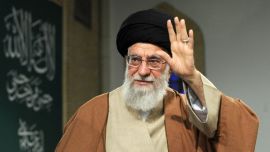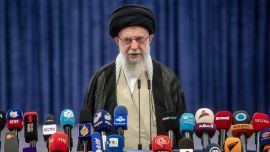The end of the two-coalition system and fragmentation, the emergence of an anti-political outsider in line with the region of Andean democracies and redrawing the map of the political scenario on yet uncertain bases – those are the first conclusions left by the consecration of Javier Milei.
How did Argentina, a republic considered institutionally stable with a tried and tested system of parties and coalitions and an exemplary democracy (even if imperfect and debt-ridden), get there? There are shared responsibilities for the until recently unimaginable arrival of Milei to the top of the institutional pyramid.
First and foremost, the crashing failure of the last two administrations of Cambiemos and Frente de Todos.
Neither Mauricio Macri nor a united Peronism, which alternated in power in the last decade, were capable of taking Argentina out of the stagnation beginning in the latter stages of Cristina Fernández de Kirchner’s second presidential term – worse still, only deepening the crisis.
As said before in this space but worth repeating: Jean-Jacques Rousseau said that people are always looking for good but don’t know where it is. The popular vote has all the logic of that search. The options making up the coalition system failed. Fatigue with an eternal present proved stronger than fear.
That is the origin of a phenomenon better interpreted by sociologists than political scientists but the installation of the Milei candidacy and making it competitive should also be sought in the contribution of a government with an interest in dividing the opposition.
To that contribution should be added Macri’s personal bet on an alliance with Milei when he had relinquished his own presidential candidacy. Macri had already demonstrated his incapacity to handle the fratricidal infighting within Juntos por el Cambio by siding with one of the candidates, thus showing himself to be incapable of a leadership with integration. The approach to the economist was going to be pronounced before the first round of the general elections, thus disconcerting even his own candidate, Patricia Bullrich. Finally, Macri and Patricia Bullrich came clean on their option for Milei, thus permitting the latter to break through his ceiling. The candidacies, the scrutineers and the funds for Milei came from Macri this time round, something better explained by psychologists than by political scientists.
Just as we do not know the terms of the agreement between Alberto Fernández and Cristina Fernández de Kirchner sweeping Peronism to power in 2019, so we do not know the conditions imposed by Macri and Milei. The latter will depend on the former to guarantee governance. A dramatic plea from Milei to the ex-president did become known in recent weeks but the role adjudicated to Macri is one of the unknowns opening up. The ex-president has spoken of the next government’s need for “external intelligence” to advise it but today Macri is one step ahead of that, pondering the advantages of governing behind the scenes.
That leads to the question of what Milei is going to do. For a start, he will have to avoid his power being diluted by Macri. In the last weeks of the campaign, we saw Milei’s efforts to stop his ally’s advance in the scrutineering of Buenos Aires Province. On Sunday night he thanked Macri for his “disinterested” support. For all his aggressive posturing, Milei has shown himself to be a weak personality – that was exposed in the debate with Massa.
As Graciela Fernández Meijide said these days, Milei has known how to hide his authoritarian streak, moderating his iconoclasm to the degree his emotional outbursts permit, but that does not wipe out the scorn for democratic values demonstrated throughout his short political career – a democracy whose underpinning is above all ethical. His running-mate Victoria Villarruel has vindicated state terrorism, at first subtly and then explicitly towards the end of the campaign. She has done so via her claim for “complete justice” to include the victims of the terrorism of the 1970s.
There are many doubts about the feasibility of Milei’s programme of drastic reforms extending beyond the economic sphere, to which should be added the role of the hard-line Macri camp during his Presidency. Some of those leaders are people who believe in and respect the values on the basis of which democracy was reconstructed four decades ago, but others apparently not.
Milei’s victory concludes the experience beginning in 2015 with Cambiemos with the definite rupture of the Unión Cívica Radicals and Coalición Cívica, to which should be added PRO’s moderate sector whose referential figure is outgoing City Mayor Horacio Rodríguez Larreta. These realignments will find their expression in Congress in the form of new legislative caucuses.
Artificial unity
The defeat will also bring to an end the unstable internal balances and the artificial unity of Peronism with the movement disbanding.
Massa has virtually announced his retirement from political life, something which very few people believe, with talk of his leaving the Economy Ministry the next day. Decisions of this kind should drag down Fernández de Kirchner, who will return to private life bereft of any immunity. La Cámpora will seek refuge in Buenos Aires Province whose Governor Axel Kicillof poses another unknown – it has already been anticipated that he will seek to inaugurate a new and superior stage of Kirchnerism as one of the emerging figures.
The main doubt is where President Milei will be taking Argentina. Even if Macri guarantees basic governance by supplying him with teams and the necessary parliamentary support, nothing ensures the success of an agenda of opening up the economy.
Economic reforms will demand political agreements in Congress, which, apart from giving viability to the changes, will need to guarantee social peace. But there will be no parliamentary majorities – a combined caucus of La Libertad Avanza and PRO would in the best of cases unite 80 deputies, far from the 129 necessary to start a session.
Fragmentation is one of the main consequences of this election. The libertarian has said that he will resort to plebiscitary mechanisms for the approval of his more controversial proposals. In recent days there was a curious phenomenon – many people leaned towards Milei in the conviction that in the final analysis he will not be keeping his promises.
We will soon see if Milei is in emotional shape to assimilate the pressures implied by governing. If not, we could be drifting into institutional waters whose outcome is also uncertain.
The libertarian’s victory is taking democracy into an unknown degree of tension in the 40th year of its recovery. Until now the system has emerged strengthened, each time it has been harassed, but never before has democracy itself come under threat, even with the authoritarian deviations of Kirchnerism.
We are heading into the unknown.






















Comments